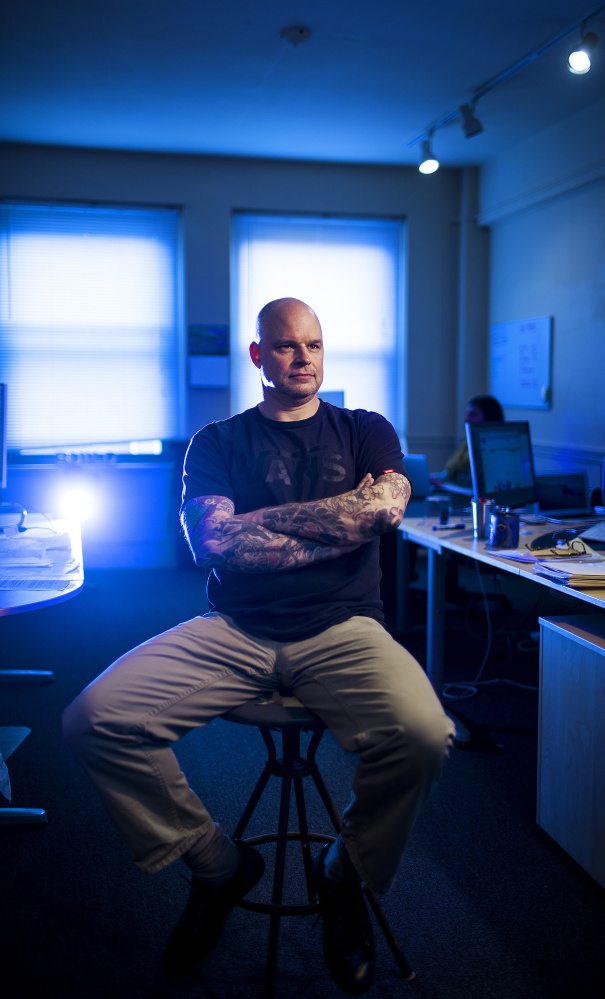If you visit the website for The SOAP group, the company John Rooks founded in 2003, you’re welcomed by a line that says “Just what the world needs … another sustainability consultant.”
Since he is a sustainability consultant (SOAP stands for Sustainable Organization Advocacy Partners), it’s an intriguing example of contrarian marketing. Furthermore, last year he told this paper that he hoped the new software he co-created to help small and midsized businesses track their sustainability efforts would put SOAP out of business. We called him up to find out more. Topics covered included self-deprecation, software and skateboards. Also, tattoos.
READING LIST: Rooks grew up in Harvard, Massachusetts, where he was “a huge whale nerd. That was just me as a kid.” By the time he was 14, he was ready to be an ecoactivist. “One of the first books that set me off was Edward Abbey’s ‘The Monkey Wrench Gang.’ ” Followed shortly thereafter by Dave Foreman’s “Ecodefense: A Field Guide to Monkeywrenching.” Some kids want to run away to join the circus: “I wanted to run away with Greenpeace.” This led to some interesting free-ranging kid stuff. “I used to break into the local Army base.” (That would be Fort Devens.)
SOUND THE SIRENS: So … what was he doing on the base? “I probably was doing nothing, but it felt like something. I was picking up bullet casings, which is a horrible idea by the way. I wasn’t going to go in there and spike trees or anything. I had to find whatever was accessible to me to feel like I was subversive. It was just stupid, right?” But he didn’t end up in the clink.
WRITTEN IN INK: Rooks has some major ink on his arms. Given his love of the monkey-wrenching philosophy, any inked-in references? “Oddly, none of the ink is sustainability-related, unless you apply a quasi-Buddhist lens to the whole thing,” Rooks wrote in a followup email. “It’s not like I have any pics of Ed Abbey or Terry Tempest Williams or anything.”
EARLY DAYS: Before coming to Portland, Rooks was a partner in an advertising agency in New Hampshire for a number of years, then worked for an environmental consulting firm. Sustainability wasn’t yet a part of the conversation, it was more about green marketing. He used to give clients what he called authenticity audits, to make sure they weren’t just looking for someone to greenwash them. “It would scare the crap out of clients.” Somewhere along the line, he took a turn into the nonprofit world, trying to help the good guys communicate better.
He did some work for the state on recycling issues, as well as Clynk, Hannaford’s bottle and can redemption company, but most of his clients were out of state. “Our niche was really in progressive companies.” Like Clif Bar.
CHANGE IS GOING TO COME: “I think the market for what we do matured in Maine and so we started doing more Maine work.” His client list today includes Baxter Brewing, which is using Rapport, the software Rooks and a team of four others (including his brother) developed to put SOAP out of business.
ABOUT THAT … REALLY? “Seriously, that is a strategy in my brain.” Rapport was created as sort of a DIY means for a smaller or midsized producer or company to understand their own carbon footprint, whether for a sales strategy, a request from those they supply or out of the goodness of their hearts. It’s not an app, but rather a hosted website in the cloud where the sustainability numbers get crunched.
Rapport scored a big tech win when it was awarded a $100,000 investment from AOL founder Steve Case during a pitch competition in Portland last October. Other Maine companies that Rooks said have joined the Rapport roster are Idexx and Wex Inc., which are not exactly small.
GOOD NEWS: From where Rooks sits, the sustainability movement is looking good. “There was a real risk of sustainability being a fad, and I think that now people are looking at it from a much more strategic standpoint … we see it from large and small businesses; they are using it as a business strategy.” Thoughtfully. “As opposed to when I started,” he said, when prospective clients “said things like, ‘It’s Earth Week, can you make our logo green?’ ”
SELF-SUSTAINING: How does he practice what he preaches? No solar panels on the roof of his house, but he has been known to commute on a skateboard in the past. It’s a long board, which means he takes guff from his 15-year-old for riding “old man board.” That’s OK, he says. “Short boards are for tricks. Mine’s a cruiser.” Just right for a guy in the sustainability business for the long haul.
Send questions/comments to the editors.



